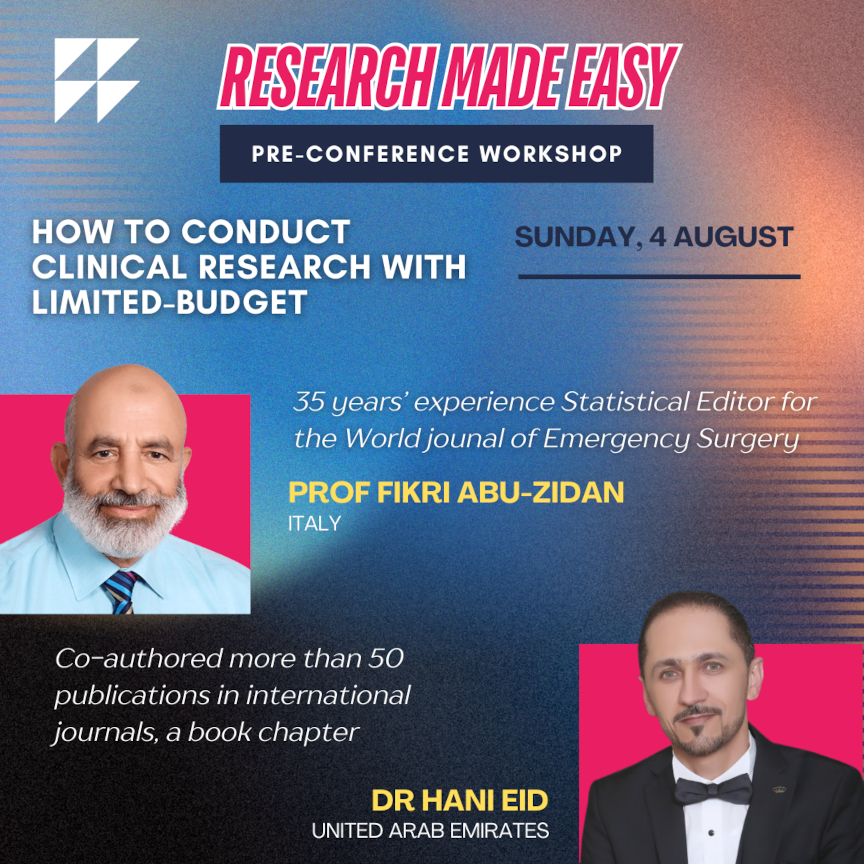Jointly Organized



EMAS Workshop
How to Conduct Clinical Research with Limited-Budget
TITLEHospital Kuala Lumpur
LOCATION04
AUG 2024
Director & Instructor
Professor Fikri Abu-Zidan
Professor Fikri Abu-Zidan is an international scholar in acute care and trauma surgery, disaster medicine, point-of-care ultrasound, and applied medical statistics and research methods. During his 43-years career, he has made major contributions to trauma management, education and research in Kuwait, Sweden, New Zealand, Australia, and United Arab Emirates. He has contributed to more than 500 publications in books and refereed international journals. He presented more than 770 invited lectures and scientific abstracts and received more than 40 national and international awards for clinical, research and educational activities. He chaired the organization committees of seven successful international conferences on Trauma management, Critical Care, and prevention.
Currently, he serves as the Statistical Consultant for the World Society of Emergency Surgery, as the Statistical Editor for the World Journal of Emergency Surgery, and as the Biostatistical Editor for European Journal of Trauma and Emergency Surgery. He has served as the Chair of the Human Research Ethics Committee of UAE University (2017-2019). He developed numerous innovative approaches in his research, educational and clinical activities He is extensively involved in medical research since more than 40 years. This resulted in developing practical workshops on medical research methods and writing that has been running globally in different countries. It mingles his extensive clinical, research, statistical, and educational experience into very attractive and educational workshops in which he shares his extensive research design, statistical analysis, and editing with the participants.
Dr Hani O Eid
Dr Hani O Eid is a General Practitioner, who obtained his MBBS degree from the University of Gezira, Sudan in 2002. He is currently working for the National Search and Rescue Center -Air Ambulance (UAE National Guard) since December 2023. Before that, he worked in the Emergency Departments of different Governmental and Private sector hospitals in the United Arab Emirates. He has also worked in a prehospital setting, including Ground Ambulance Service, Helicopter Emergency Medical Service (HEMS), flying physician, and Motor Sports Events such as Formula 1. He has deep interest in medical research, Trauma registries, and medical informatics. His efforts and IT skills were pivotal for the establishment of two leading major Trauma Registries in the United Arab Emirates under the direct training of Professor Fikri Abu-Zidan, one of the leading trauma surgeons in the Middle East. He worked as a full-time Research Fellow (2003-2007) and as a Senior Research Fellow (2013-2014) in the Department of Surgery, College of Medicine and Health Sciences, United Arab Emirates University. He has co-authored more than 50 publications in international journals, a book chapter, and has been invited by International Journals to review articles and to join their Editorial Boards.
Objectives
- Define feasible research questions that can be answered with a limited budget.
- Guide the audience on the basics of writing a case report and a review article.
- Learn the principles of performing research on public available data.
- Designing a diagnostic study/li>
- Designing a survey/questionnaire
- Using a Delphi methodology and guidelines
- Guide the audience on the basics of analyzing data.
Our Timetable
Schedule Plan
Registration
 7.30-8.00 am
7.30-8.00 am
Session I: Starting without funds.
Ice breaking, teams’ allocation.
 8.00 – 8.20am
8.00 – 8.20am
Research with limited budget.
 8.20 – 8.35 am
8.20 – 8.35 am
Conceiving a research question
 8.35 – 9.00 am
8.35 – 9.00 am
Team exercise. Generating a research question
 9.00 – 9.40 am
9.00 – 9.40 am
Case reports
 9.40 – 10.00 am
9.40 – 10.00 am
Coffee break
 10.00 – 10.20 am
10.00 – 10.20 am
Session II: Low-cost research designs
Case series
 10.20 - 10.40 am
10.20 - 10.40 am
Review articles
 10.40 - 11.00 am
10.40 - 11.00 am
Preparing your figures
 11.00 - 11.15 am
11.00 - 11.15 am
Q&A
 11.15 – 11.20 am
11.15 – 11.20 am
Secondary data
 11.20 – 11.50 am
11.20 – 11.50 am
Questionnaires
 11.50 – 12.10 pm
11.50 – 12.10 pm
Analyzing a questionnaire
 12.10 - 12.30 pm
12.10 - 12.30 pm
Lunch break
 12.30 – 1.30 pm
12.30 – 1.30 pm
Session III: Low-cost research designs
Delphi methods
 1.30 - 1.50 pm
1.30 - 1.50 pm
Diagnostic studies
 1.50 - 2.10 pm
1.50 - 2.10 pm
Team Exercise: Diagnostic studies
 2.10 - 2.30 pm
2.10 - 2.30 pm
Analyzing your data
 2.30 - 3.00 pm
2.30 - 3.00 pm
Common research errors
 3.00 - 3.20 pm
3.00 - 3.20 pm
Final Advice
 3.20 - 3.40 pm
3.20 - 3.40 pm
Evaluations and Feedback
 3.40 - 4.00 pm
3.40 - 4.00 pm